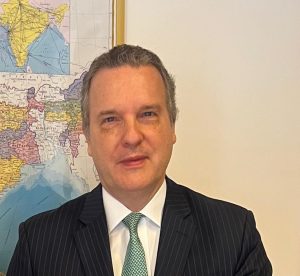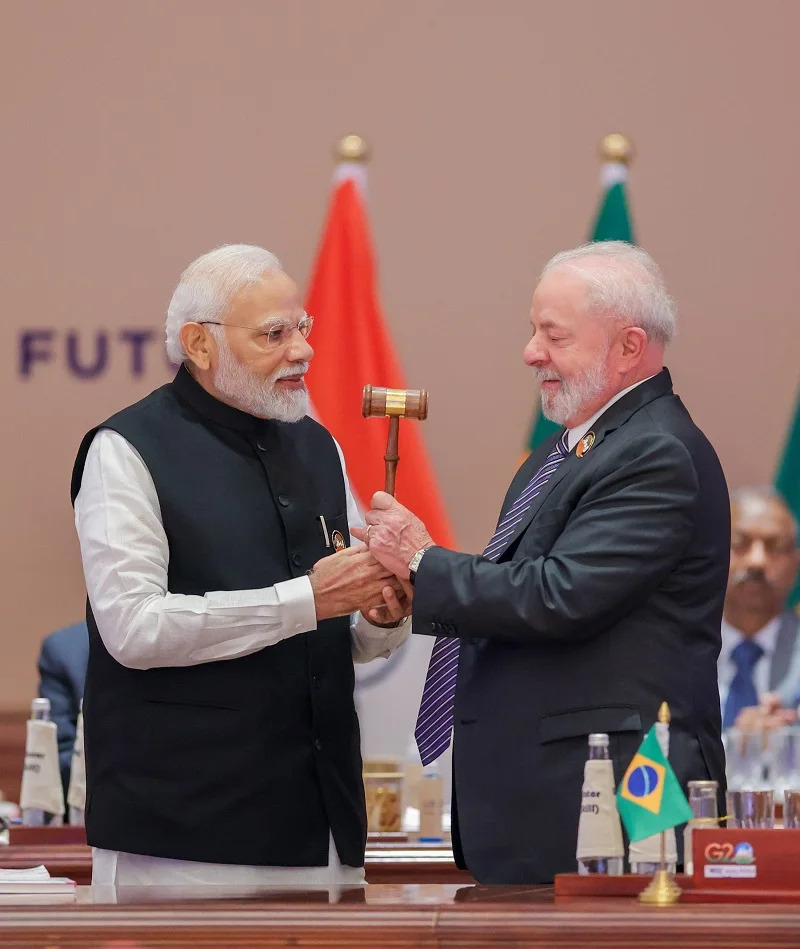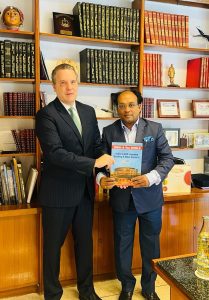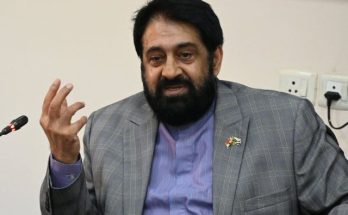By Manish Chand

Brazil will formally take over the G20 presidency from India on December 1, 2023. As Brazil prepares for this defining date in its diplomatic calendar Brazil’s Ambassador to India Kenneth Félix Haczynski da Nóbrega tells Manish Chand, CEO, India Writes Network and Centre for Global India Insights, that his country will follow the Indian example by linking global challenges with domestic priorities of combating poverty and ensuring social cohesion. Lauding India for managing the G20 consensus on the Ukraine issue, the envoy underlines that Brazil will carry forward the core agenda of India’s G20 presidency, with its own distinctive stamp.
Excerpts:
Q) India-Brazil relations are experiencing a new momentum, especially after President Lula’s visit to New Delhi for the G20 Summit. How do you look at this new energy in India-Brazil relations?
A) During his first two mandates, President Lula worked very hard to boost bilateral relations. In this period, India and Brazil launched a strategic partnership, and BRICs and IBSA were established. So now with Lula coming back for his third mandate, he is again concentrating on boosting the India-Brazil bilateral relations. We have very concrete opportunities to expand economic and trade relations. In months to come, you can expect an acceleration in bilateral economic relations.
Between early November and early December, we are going to have six or seven high-level visits from Brazil. These visits, among others, will include the visit by the governor of the state of Mato Grosso, the largest producer of agribusiness in Brazil, will visit India. It will be followed by the visit of the governor of Parana, which is not only a big agribusiness producer, but also an important industrial hub in Brazil. Then you are going to have the visit of the minister of agriculture, who will lead a large business delegation from Brazil.
We will have the visit of the cooperative, agricultural cooperative of MERCOSUR. There is significant interest among the business community and the civil society in Brazil to expand relations with India. It’s up to us government officials to provide the necessary support to boost the partnership between the two countries.
Q) How do you look at the success of India G20 presidency? Some world leaders and experts say the G20 presidency has showcased India’s emergence as a major global player. How do you look at that?
A) It was a historic presidency in terms of bringing the G20 together and linking the G20 with domestic issues. I think that connecting global challenges with the country and the society is an important move because sometimes you want to make a division between the foreign policy and the domestic policy. This kind of division has no place any longer in our world. The Brazilian presidency will also try to connect the big global challenges to the domestic issues. In this regard, we’re going to follow the Indian example.
The New Delhi summit shows the capacity of India to hammer out a consensus on global issues. Achieving a joint statement against such a complex geopolitical background says a lot about India’s emergence as a global player. It says a lot and says it all because these paragraphs on the ongoing Ukrainian conflict were really a feat.

Q) Can one expect a continuity between India’s G20 presidency and Brazil’s G20 presidency? What will be key areas of convergence which will be carried forward?
A) Brazil’s G20 presidency, to a considerable extent, will build on India’s G20 presidency. The major priorities of India’s G20 presidency such as food security, the Global South and climate change will continue to be prominent in Brazil’s G20 presidency agenda. Promoting sustainable development and providing debt relief to developing countries will also be prioritised by Brazil. The idea is to forge new models of financing which will suit the repayment capacity of developing countries.
We should not concentrate only on the financing for climate mitigation, but also on additional financing for development in developing countries. Trade has been always a channel of economic growth for developing countries. Connecting the economies of developing countries to the large markets of the big economies is critically important. We are quite worried that some big economies use environmental concerns to justify protectionist measures.
Food security will be a high priority for Brazil’s G20 presidency. During his first two terms, President Lula is proud of having eradicated hunger in Brazil. But hunger is now back. So, now he wants to make fighting hunger his top priority not only in Brazil, but also throughout the world.
In sum, our presidency will emphasize the issues of fighting poverty, fighting hunger, sustainable development, the preservation of environment, social inclusion, and economic development. The overarching paradigm of our presidency is bringing back the concept of sustainable development to the centerstage of international discussions.
Q) Under its G20 presidency, India prioritized expediting reform of the global governance architecture, including the United Nations Security Council. Going forward, how do you see India and Brazil cooperating on the reform of the UN Security Council?
A) We have a traditional cooperation in terms of pushing for substantial reform of the UN. What we’re seeing is that the UN is not delivering for the Global South and that’s why we recently saw the BRICS expansion. BRICS expansion is a very significant fact. It’s not just the BRICS expansion; the fact that more than 20 countries want to join BRICS says something about the desire for global governance reforms. India and Brazil will be stepping up efforts to fast-track reform of the UN and UN Security Council.
Q) President Lula played an important role in the formation of the India-Brazil-South Africa trilateral grouping. How do you look at the prospects of revival of IBSA in the days to come?
A) IBSA is a unique forum in the sense that it brings together three of the largest democracies of the Global south. So, the countries, which have chosen the democratic path to development, IBSA enabled us to to exchange experiences on how to promote social inclusion and economic development within a democratic environment. This is very different when you compare it to non-democratic environments. So, what brings IBSA together is this fundamental choice of the democratic way of doing things.

Author Profile

- Manish Chand is Founder and Editor-in-Chief of India Writes Network (www.indiawrites.org) and India and World, a pioneering magazine focused on international affairs. He is CEO, Centre for Global India Insights, an India-based think tank focused on global affairs.
Latest entries
 India and the WorldFebruary 27, 2026Modi visit: India-Israel partnership enters a new era
India and the WorldFebruary 27, 2026Modi visit: India-Israel partnership enters a new era India and the WorldFebruary 24, 2026Unravelling Modi’s Israel journey: What to expect
India and the WorldFebruary 24, 2026Unravelling Modi’s Israel journey: What to expect India and the WorldFebruary 17, 2026South-by-South: Focus on people-centric solutions at India AI summit
India and the WorldFebruary 17, 2026South-by-South: Focus on people-centric solutions at India AI summit India and the WorldFebruary 7, 2026Modi hails interim India-US trade deal, Goyal says no concessions made on agriculture
India and the WorldFebruary 7, 2026Modi hails interim India-US trade deal, Goyal says no concessions made on agriculture







